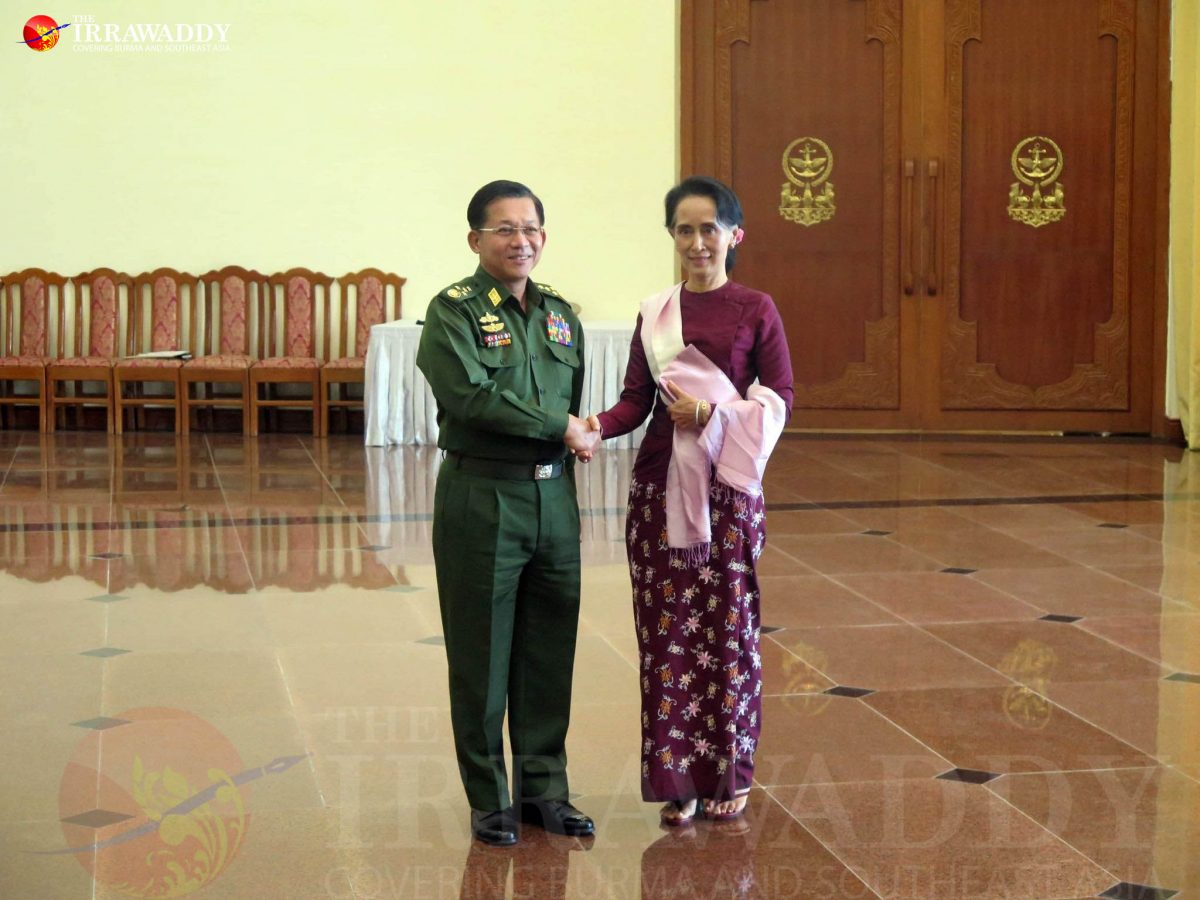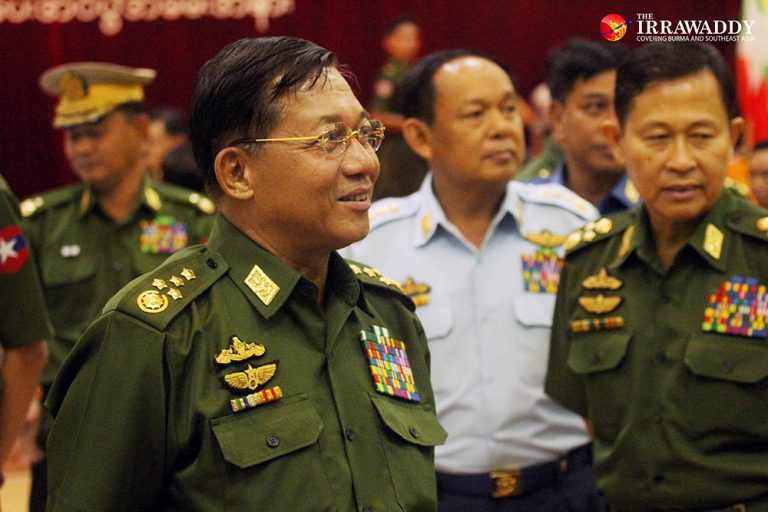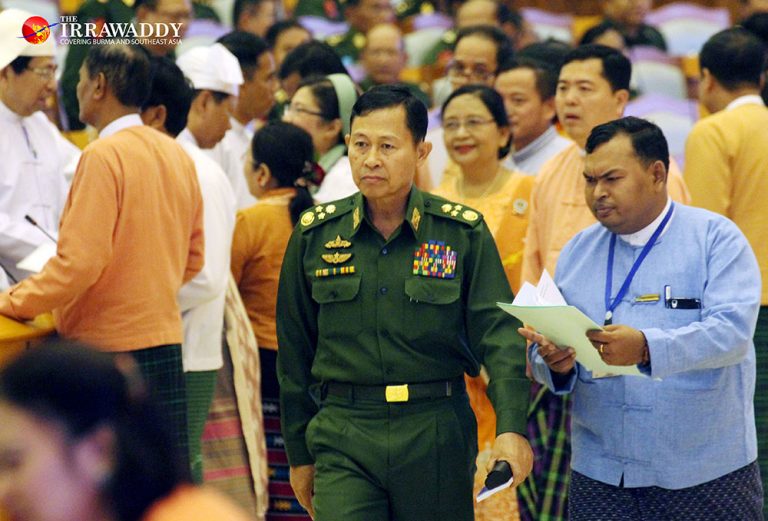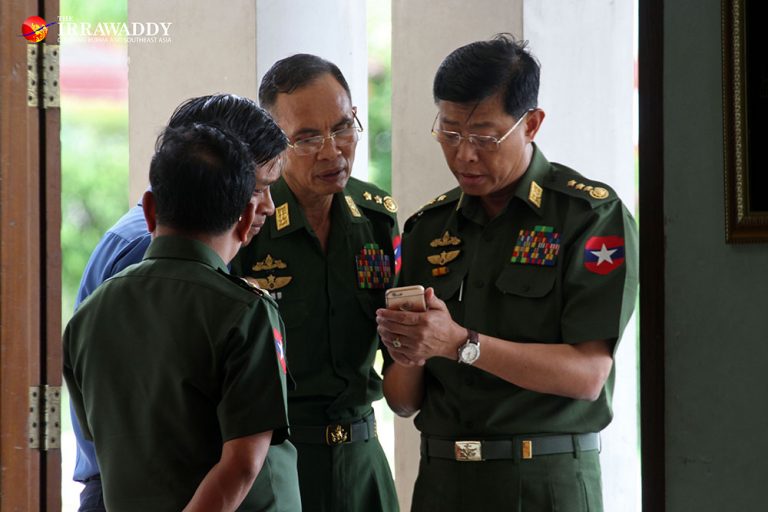With the election victory of the ruling National League for Democracy (NLD) earlier this month and the prospect of the NLD continuing to hold office for the next five years, it’s worth pondering whether Commander-in-Chief of Defense Services Senior General Min Aung Hlaing will retire.
He, of course, is the one who will have to decide about his retirement. As the head of the military, his relationship with Myanmar’s civilian government leader Daw Aung San Suu Kyi will continue to shape the politics of the country.
After the NLD won the general election in 2015, its leader Daw Aung San Suu Kyi paid a call on the military chief at his office in Naypyitaw. That same year, the military chief attended the offering of meals at Daw Aung San Suu Kyi’s residence in Yangon to Buddhist monks to mark Martyrs’ Day, which commemorates the day on which Daw Aung San Suu Kyi’s father General Aung San was assassinated along with his colleagues in 1947.
From those overtures, people had expected to see improved civil-military relations, but over the past five years, friction has prevailed. So, it will be interesting to see if there is political give and take again this time.
Asked by the Japanese newspaper Asahi Shimbun in early November about the possibility of retirement and his political future, Snr-Gen Min Aung Hlaing evaded the question.
In an interview with a Russian news agency during his visit to Russia in June, he said his future plans depend on the wishes of the people and his political experience serving the Tatmadaw (Myanmar’s military) for more than 40 years.
Some political observers viewed that as a hint the military chief has his eyes on the presidency.
But this was before the NLD’s 2020 landslide in which the Union Solidarity and Development Party (USDP), the military’s political proxy, suffered a resounding defeat.
Now there is speculation that he will not retire in April 2021, when he turns 65, and continue to hold office for two extra years.
At the age of 18, he attended the 19th Intake of the Defense Services Academy in 1974. He became a brigadier general in 2002, and commandant of the Defense Services Academy the following year. He was appointed the commander of Western Command in 2004.
He was promoted to lieutenant general as the head of the Bureau of Special Operations in 2008. Two years later, he was appointed chief of general staff (army, navy and air). In 2011, he became the commander-in-chief of defense services as a general over General Thura Myint Aung, who was widely tipped to be the next military chief succeeding Senior General Than Shwe.
According to the structure of the Tatmadaw, he became vice senior general in 2012 and has been senior general since 2013.
Due to the transition in 2021, it is unlikely that Snr-Gen Min Aung Hlaing will retire soon, said political analyst Dr. Yan Myo Thein.
“And it can also be called a sensitive period. In such a period, normally there won’t be a new military chief,” he said.

Civilian law doesn’t apply
Under the law, the retirement age for most civil servants is 60, but this provision does not apply to Defense Services personnel.
Article 291 of the 2008 Constitution stipulates that relevant military laws shall be applied to military personnel because the nature of military service differs from that of the civil service.
Snr-Gen Min Aung Hlaing turned 60 in 2016, but he extended his term under the Defense Services Act. It is not clear if the NLD government approved his extension.
Former military officer and political researcher Dr. Aung Myo said: “To extend his term, he only needs to have the Defense Department issue an instruction for that. His refusal to retire may only disadvantage the potential [next] military chief. If he can arrange appropriate positions for others, he will be able to control his subordinates.”
Some observers said the military chief has shown no sign of retiring, adding that he would visit China before his retirement.
Younger generation
Normally in Myanmar’s military, a brigadier general is supposed to be promoted after seven years in the rank, a major general after six years and a lieutenant general and general after five years. If they do not receive promotions in that timeframe, they are sent to the military auxiliary force. There are some who believe that the military chief should retire after he has served 10 years.
But the auxiliary defense forces law enacted in January 2011 says retired military personnel can return to their military duties within five years after their retirement in case the military needs their service.
Another factor is whether the ruling NLD will continue to recognize Snr-Gen Min Aung Hlaing as the military chief.
Under the Constitution, the president shall appoint the military chief based on the proposal and approval of the National Defense and Security Council (NDSC).
The 11-member NDSC consists of the president, the two vice presidents, the speakers of the two houses of Parliament, the army chief, the deputy army chief, the foreign affairs minister, the border affairs minister, the home affairs minister and the defense minister.
Over the past five years, the NLD has not convened a single NDSC meeting. If the Tatmadaw itself does not nominate a new military chief, then Snr-Gen Min Aung Hlaing will remain in office until the NLD convenes an NDSC meeting.

International pressures
There are other factors that will make the military chief consider retirement. There are international pressures to prosecute him at the International Criminal Court.
More than 730,000 Rohingya fled across the border into Bangladesh after Myanmar’s military launched counterinsurgency operations in response to attacks by the Arakan Rohingya Salvation Army in August 2017. Snr-Gen Min Aung Hlaing came under international pressure over alleged human rights violations and abuses.
The international community including the US has imposed sanctions on Myanmar military officers including Snr-Gen Min Aung Hlaing, which marred the reputation of the Tatmadaw.
Snr-Gen Min Aung Hlaing has defended the military’s actions and said that he did not accept the intervention of the international community.
Who’s next in line?
Three of the top brass are likely candidates to become the next military chief when Snr-Gen Min Aung Hlaing retires.
They are Deputy Commander-in-Chief of Defense Services Vice Senior General Soe Win, Chief of General Staff (Army, Navy and Air) General Mya Tun Oo, and Chief of Staff (Army) Lt-Gen Moe Myint Tun.
Vice Snr-Gen Soe Win, who reportedly has close ties with State Counselor Daw Aung San Suu Kyi, graduated from the 22nd Intake of the Defense Services Academy.
He is widely perceived to be a typical soldier and has fewer business interests compared to other military leaders. From a lieutenant in 1980, he rose through the ranks to become the commander of Northern Command in 2008, chief of the Bureau of Special Operations 6 in 2010, and deputy military chief in 2011.
“The next military chief must be someone who can control the military. He has the capacity to do so. He can serve as the military chief, and Gen. Mya Tun Oo can serve as the deputy military chief. It does not matter who is nominated by the Myanmar military as one of the three vice presidents,” a source close to military told The Irrawaddy, referring to the fact that the vice president chosen by the military will be in a largely ceremonial position without power. As the NLD dominates the Parliament, the military vice president can at best become the second vice president, and will have virtually no chance of becoming president.
Political analyst Dr. Aung Myo said he believes Vice Snr-Gen Soe Win will not become the military chief because he has good ties with the NLD and Daw Aung San Suu Kyi. Instead, he believes, he will be the vice president nominated by the Tatmadaw.

Observers also pointed out that former Home Affairs Minister Lt-Gen Kyaw Swe was retired after he got too close to Daw Aung San Suu Kyi.
According to Tatmadaw tradition, the deputy military chief always retires along with the military chief, leaving younger generations to take the positions, observers point out.
The second popular candidate is Gen. Mya Tun Oo, a graduate of the 25th Intake of the Defense Services Academy. He started his military career as a lieutenant in 1983, and was appointed commander of the newly minted Eastern Central Command in Kho Lam, Shan State in 2011.
He has served in different positions—army chief of staff, the chief of military security affairs, and chief of Bureau of Special Operations 6—and is known for rapid promotions.
In the military he is viewed as a “hard worker with high caliber and low personal interests.” Some observers also expect that he will be the vice president nominated by Tatmadaw.
The third is Lt-Gen Moe Myint Tun, a graduate of the 30th Intake of Defense Services. He served as a personal staff officer of Vice Senior General Maung Aye during the military regime.
He is concurrently serving as chief of staff (Army) and chief of the Bureau of Special Operations 6.
According to observers, the military chief must be around 54 years old when he takes the job, and Lt-Gen Moe Myint Tun is the only one who meets that criterion.
Snr-Gen Min Aung Hlaing became the military chief at the age of about 55.
Some observers say if Lt-Gen Moe Myint Tun becomes the military chief, Lt-Gen Kyaw Swar Lin of the 35th Intake of the Defense Services Academy will become the deputy military leader.
“If Ko Moe Myint Tun were to be appointed the military chief, there is a need to reshuffle his seniors. If the position is given to Vice Snr-Gen Soe Win, there is no need to change much,” said one observer who asked to remain anonymous.

General Mya Tun Oo (right) with Defense Minister Lt-Gen Sein Win. / Htet Naing Zaw / The Irrawaddy
Continued influence?
Snr-Gen Min Aung Hlaing in a meeting with the Restoration Council of Shan State in 2019 said that the next military chief must be one who will implement his policies. So observers suggest that he will hand-pick someone whom he can control.
He will however not serve as a vice president nominated by the Tatmadaw, but if negotiations with the government go well, he could become chief of the Military Commission or NDSC Counselor, some observers suggest.
Translated from Burmese by Thet Ko Ko
You may also like these stories:
Myanmar’s Losing Party Keeps Pushing Claims of Election Fraud and Seeks to Overturn Outcome
Myanmar Military Chief’s Warnings Raise Specter of Post-Election Chaos












